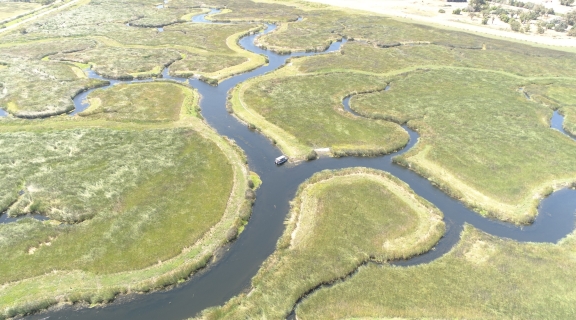
Rosenberg Institute Seminar Series - Scott Blankenship
Overview
Scott Blankenship Ph.D., Genidaqs Science Director, Senior Geneticist
The importance of place; Fish diversity observed using DNA metabarcoding
Abstract: The importance of place cannot be overstated in biology, as place often drives the principal partition in genetic variance, is correlated with abundance, and underlies biodiversity. This project describes fish biodiversity observed using DNA metabarcoding within an evolving tidal wetland engineered as a living laboratory for habitat restoration (Dutch Slough Tidal Marsh Restoration Project). DNA metabarcoding approaches were incorporated into the Dutch Slough project performance assessment, as reticulated tidal habitat is challenging to survey effectively with nets. An EDNA sampling designed was executed pre and post breaching of levees surrounding the engineered habitat exposing the habitat to the San Francisco Estuary. The fish community observed at each survey event contributes to base condition assessment of 1) fish community trends as habitat evolves over time, 2) the presences of protected, native, and non-native species, and 3) seasonal differences in habitat use. Comparing pre and post breach eDNA surveys, fish biodiversity increased within restored habitat post breach. Fish in the project vicinity appeared to colonized habitat once access was provided. Non-native species outnumbered native species by approximately 2-to-1, reflecting the background condition of the Estuary. Among the 42 fish species observed during ongoing eDNA surveys, five protected native fish species have been observed within restored habitat (Chinook Salmon, Green Sturgeon, Longfin Smelt, Pacific Lamprey, and Rainbow Trout).
Bio: Scott has over 20 years of experience applying genetic data to population monitoring and fishery science, including extensive experience combining the newest tools of molecular biology and genetics theory with field observations of fish populations and their habitat. As Science Director at Cramer Fish Sciences - Genidaqs, Scott has focused his expertise of population genetics to relate population viability metrics to recovery goals for protected species. Scott is skilled at communicating in a practical manner how to pair eDNA approaches that determine where/when species occur with parentage & kinship genetic analysis to quantify important biological measures such as abundance, breeding success and recruitment success.